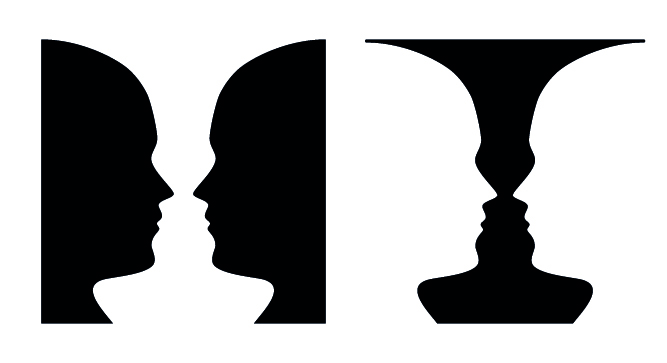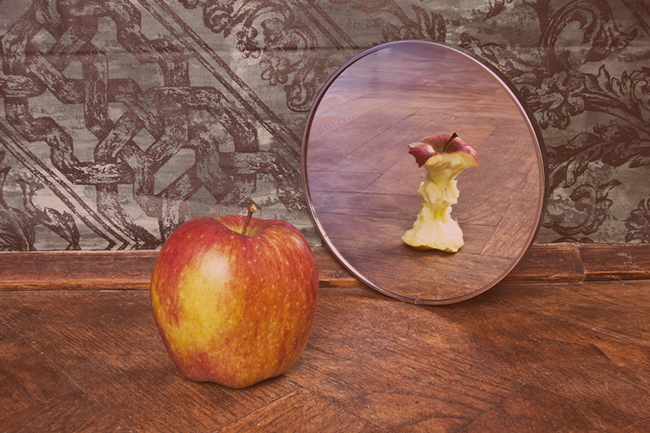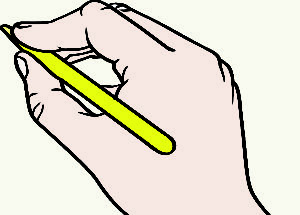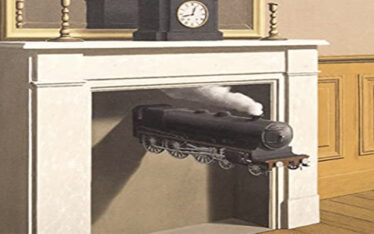
I remember a brief phase in my primary school education where I would stick a pencil between my thumb and index finger and rock my hand — my fingers crucially loose — in a half-circular motion, causing the pencil’s body to bend and warp before my incredulous eyes. I thought it was categorically gnarly (I still do actually). Why the hell was my supposedly stiff pencil looking like those noodle things we’d swing at each other in pools? My speculations were brief and inconclusive, and the communal ones weren’t much better — “It’s your eyes tricking you dude.” “Are you calling me stupid?” — even if they were probably true.
INTRUSIVE ILLUSIONS
I sometimes recall this when I walk down the street and watch the window frames disaggregate and unfurl as they roll by in retrograde flow; when I ride a bike and see each street lamp grow with unsettling smoothness and rapidity, before throwing one last splash into my eyes as they surge by me and resign their existence to mere memory; when I sway while smoking a cigarette, contemplating the drift of leaves against the background of their brothers, the convergence of doorframes as I shift infinitesimally closer to a building, the oscillation of refracted light in a half-filled glass of water. If I can allow myself a modest flex, my brain has a pretty decent visual stabilizer, so it isn’t easy to recreate the awe of that pencil bending my mind (or conversely). But if I let go of a few connections — or rather, consciously turn them off —, then anything extended in space can take on a life of its own. Convincing myself that the wall of the staircase I’m ascending is a sheet of paper (for lack of immediate counter-evidence); advancing onto the landing and forcing the wall to choose between startling my freshly irrefragable certainty or confirming it with an abdication of two dimensionality; the surprise of seeing this certainty dissipate, as though I were a scientologist trying Ibuprofen for the first time during a singularly shitty headache — this poses an endless source of entertainment.
I’m well aware of how crazy all this sounds, so I’ll move onto making some sort of point about perceptions and perception-structuring. The first principles of our nature are nicely set out so that we stay alive. The scientists call this ‘self-preservation,’ the philosophers call this ‘egoism’ and the ankle biters —wisest of them all — call it ‘cutting,’ ‘cheating,’ or ‘liar!’ These last terms have the merit of demonstrating the opportunity cost of self-love and its ascendant position in our motivational hierarchies.
These first principles are put into practice through a couple of wonderful instruments of perception. With these, we can figure out whether or not we’re about to get hit by a car or respond to our body calling out for water by identifying where such a thing is. If it’s not such a bad day, these can be used to locate your homies. There’s only a minor problem: there’s loads of shit going down constantly. Presumably, it’d be a real drag if our ears, eyes, noses, tongues, and skin could access all parts of the electromagnetic spectrum, all sonic frequencies, all odors, tastes, pressures.1 Still, I can’t help but feel that if we paid equal attention to the stimuli we register, we’d be rather preoccupied, rather frequently, and perhaps to the effect of perpetual bewilderment that might come to clash with our first principles.
INSTINCTIVELY
To counter this, a few mental faculties, proclivities, and construction tools were acquired to smoothen raw perception, and let our first principles meet their aims. With them, we become accustomed to things, we ignore things, we allow our- selves a “roughness of the eye that makes any two persons, things, situations, seem alike,”2 we make inferences based first on unclassified experience (we knew fire was murderous long before we knew its essential properties), and second, off of hearsay —; for it was determined that in order to offset all the active forgetting our brains were doing, we’d get to yak at each other about all our various inductions and discriminations. I sometimes contend that “if I didn’t see it, it didn’t happen,” but then how am I to write seriously about the Cold War when asked to do so? And more importantly, how can I justify getting pixelated on my ‘birthday?’ So these faculties and ticks and tools put the principles into practice, concentrating our experience on things deemed crucial, and relegating the rest to the class of mere incidentals, easily-forgettables.

PHFurian/Shutterstock.com
Left unexamined, this ingenious ‘self-love’ apparatus makes me walk through life in a daze. For the first principles never change, and so neither do the deep ruts which the faculties and ticks and tools take. Instead, the ruts get deeper, and I get more and more sure about what lies behind that wall of the staircase I’m ascending. The positional flux indissolubly linked with my awakened moments and movements is cruelly subjugated, weakened, drained of life. And all that just to cruise around in a veritable storm of unknowns with perfect certainty — without the slightest shred of doubt.
DOOR OF DOUBT
I think we all experience this to some degree or other for several reasons: first, because we couldn’t possibly have gotten crammed into the smallest taxonomic unit (the species)3 for nothing, and it would seem that these first principles and their cronies are crucial enough to get under everyone’s hood; second, if two dis- tinct bodies cannot occupy the same space at the same time, it follows necessarily that my experiences and the experiences of others are not and can never be identical4, and yet here I am talking about swaying around with a cigarette and assuming that what I’m writing has some sort of coherence or relatability — either its true or I’m a solipsist, and a terribly solitary one at that; what’s more, if reading a few books has taught me anything, it’s that not too few aspects of human experience rub us in more or less the same ways; third, because this disamenity I’ll call the daze sometimes manifests itself. The trait betrays itself when we acknowledge that our perception is contingent and singular and not necessarily true. For instance, I wouldn’t bash on my mama at a concert for not seeing well. She isn’t the same height as me. I can understand that if I were a different height, I might not see things the same way. I think that’s a pretty good thing, but it also shows that she and I have respective positionalities, that I can apprehend that, and that I can act in accordance with that apprehension to temporarily relax the daze.
To be sure, this third reason is a logical fallacy, plain and simple. By proving that we all perceive things and construct perceptions so as to limit doubt with the premise that we sometimes break free from this daze, I’m affirming the consequent. (This is what the kids refer to as ‘airtight logic.’). But if these reasons agree with you, or if you’re able to affirm the conclusion with other premises acceptable to you, then the consequence and my third premise (which is in fact some sort of corollary) are very nice. Namely, that we all possess this inherent systematic rejection and avoidance of doubt, and that we can all have the same capacity to free ourselves of it (come to think of it, I’m basically piggy-backing Kant’s ‘mental categories’ and Rousseau’s ‘perfectibility.’ Whether that makes me a trite plagiarist or more believable is for you to decide).
It takes conscious effort to scrutinize the unexamined flow of perceptions, but that a blind man is enjoying a movie’s visuals less and appreciating its audio more than me is not terribly difficult for me to discern, and even less difficult for me to contradict. This probably stems from the fact that “everything in my own immediate experience supports my deep belief that I am the absolute center of the universe, the realest, most vivid and important person in existence.”5 Meanwhile, if I actually think with clarity, I can also use my perceptions to conclude that I know essentially nothing. The qualification is crucially important, and it seems to me that it’s simply a matter of awareness.

Apple + Mirror TLizzu/Shutterstrock.com
In other news, it seems to me that the variant contingency of perception is not analogous but identical to the variant contingency of opinions. By opinion, I understand a judgement on the state of things. One’s opinion either approves or disapproves of the state of things, and sometimes (but of course not necessarily) extends to a normative position on how to attain a preferred state of things (things can be political phenomena for the student of politics, the universe for a cosmologist… whatever is relevant to the judgement).. It follows that an opinion is founded on a perceived state of things. If a perception is a discernment of a facet or multiple facets of reality, then an opinion can only be an amalgam of perceptions. It might be contended that our opinions derive from socialization, the media, our basic nature, the books we’ve read, the people we’ve gotten or not gotten along with, and so on. All of these, save our natural fundaments, are at their most basic level perceptions. They may be revised or unrevised perceptions, but they’re perceptions, nonetheless.
As to our natural fundaments, which exist before sense experience, these are impotent by themselves to the formation of opinions except one: that I ought to live. This, I can live with. What’s more, the more specified and particular strata of dis- positions which might be called opinions (I wouldn’t call them that), and which amount to the aforementioned one, require some sense perception to take on any meaning or usefulness. And so it follows that, without perceptions of any kind, that first unfounded and authoritarian opinion is meaningless without perceptions.
A HYPOTHETICAL PAUSE
All too often, we come across laws or ideas which are so irresistibly attractive to us that, instead of pouring our passion into figuring out where these end (i.e. where they apply and don’t apply; what they include and what they don’t; the province of their subjecting, subjection and pertinence), we have a grand old time applying them everywhere indiscriminately and in doing so, pervert the order of nature as we conceive of it (to use Spinoza’s phrase and argument). I hope that I’ve avoided that by drawing the link between perceptions and opinions, and not set this ship alight. If I’ve failed to do so, then my perversion of the relations be- tween and confines of objects and ideas follows naturally (not an incidental term), but is nonetheless some sort of ‘L.’
Now if perception doesn’t have any truth value, is absolutely drenched with persona, constitutes the fabric of all past and present experience, and compounds to form our opinions, then what the hell are we getting so touchy about people’s opinions for? People’s opinions can’t be explained by whether or not they read Al Jazeera. They have deep roots in experiences of varying emotional colors, in psychological and cultural dispositions and axiologies, and in the product of the welding of minds that comes from an encounter with an influential character.
Only after that three-courser can we start talking about Al Jazeera, and the trivial stuff. Even then, does the fact that I see transracialism as wrong (despite its perfect parallel to transgenderism, which I’m okay with) stem from an article I wrote? Christ no! I’d never even considered the opinion until B. Cousin splashed my face with cold water — ‘so to speak. The same goes for incest — completely analogous to homosexuality from the ‘love is love’ justification —; I don’t feel very swell about it, and I’m just as sure that this feeling didn’t come from a few care- fully crafted syllogisms as I am that it also didn’t come from nowhere. What lives without roots? These are all the results of the conditioning of my perceptions which, as I’ve pointed out, are similar to those of others because of common principles and regulatory instruments, and fundamentally distinct from those of others by virtue of basic physical law.
And so, in the furious race to contradict, lambast and misconstrue the opinions of others with the sole aim of nurturing our vanities and protecting ourselves from the doubt to which we are allergic by nature, we unfairly cut ourselves off from others. Unfairly, because I know that my perceptions fuel me with nonsense and bullshit, just as they sometimes lead me to truth (if I may be so bold). Categorically refusing the opinions of others is therefore what the economist fellas refer to as ‘inefficient’ (although what the hell that truly means, I have no idea).

CoxDesign/Shutterstock.com
The craziness of accepting perceptional differences and falling ass over teakettle to confuse and destroy judgmental differences is clear. Why? Because perceptions give us crap and truth, and therefore have no inherent truth value. While opinions do too, the fact that they are presented means that the person propounding an intuition, however slight, believes that the idea they take to be true is true and coherent and capable of being intuited by others.
REASON RESURRECTED
I’m not saying that you should believe anyone’s opinions — would I believe all your perceptions? I’m not saying that you should believe no one else’s opinions — don’t some of my perceptions lead me to truth? Surely I wouldn’t take a racist opinion seriously, but will calling a racist “racist!” cure racism? Will calling a de- hydrated man “dehydrated!” make him hydrated? Only the knowledge of the essence and causes of dehydration can produce the elixir.
I’m only saying that it’s sheer idiocy to decide automatically that others are wrong and I are right, especially since I don’t have to make that automatic decision! I feel like this needs to be said because I see it all the time, and when I act like a moron (and I sure as hell do), I do it too.
As if the opinions of others don’t arise from the same filtering and constructing of stimuli; as if the opinions of others are never commensurable with my own; as if the opinions of others are singularly devoid of truth as opposed to mine; as if the walls of resistance I meet when I say something I think doesn’t come from the same provocation of vanity that I experience when someone posits something I can’t accept without watching a belief I made myself burn and extinguish; as if I wouldn’t believe the same thing if I were in their shoes; as if the coin doesn’t have two sides, just because I’m always on the same side — how insane! And so it may very well be that Spinoza was saying something interesting when he contended that “the endeavor to understand is the first and only basis of virtue.”
In that brief phase in my primary school education, where I’d wedge a pencil between my thumb and index finger, I learned that things aren’t what they seem. What I saw defied what I’d seen beforehand, and what I thought I knew grew terribly frail before my eyes.
My brief speculations having come up short, I asked a classmate, and he answered. The question and the answer, together, point to “the common root, from a fundamental will of knowledge, pointing imperiously into the depths, speaking more and more precisely, demanding greater and greater precision.” No, he wasn’t calling me stupid. How vain of me to think that he was making such a claim when he said no such thing! He only joined me in the search for “our ideas, our values, our yeas and nays, our ifs and buts [which] grow out of us with the necessity with which a tree bears fruit… Whether you like them, these fruits of ours? – But what is that to the trees! What is that to us, to us philosophers!”6
___________
1. Even if we could, we’d quickly find out that there’s more to perceive than that which we originally inferred to be existent yet imperceptible and came to perceive; I can now either drop the line of thought or assume that we’d gain the perception of these newly gleaned imperceptibles, taking us into circularity ad nauseum — this is why hypotheticals are stupid.
2. Walter Pater, Renaissance Studies
3. Although I think this probably also applies to other animals, that would take me down a K- Hole of reasons and qualifications and distinctions between humans and alternative sentience. It could also make the point indigestible for some, so I’ll let it be.
4. Here, I’m rejecting Nietzsche’s Eternal Return, even if I admit that similar states come up ade- quately often. Otherwise, our epistemic portfolio would consist of a few shaky associations, and not laws and that type of stuff.
5. David Foster Wallace, This is Water.
6. Friedrich Nietzsche, On the Genealogy of Morals
About the Article
An introspective on how our perceptions shape opinions.



